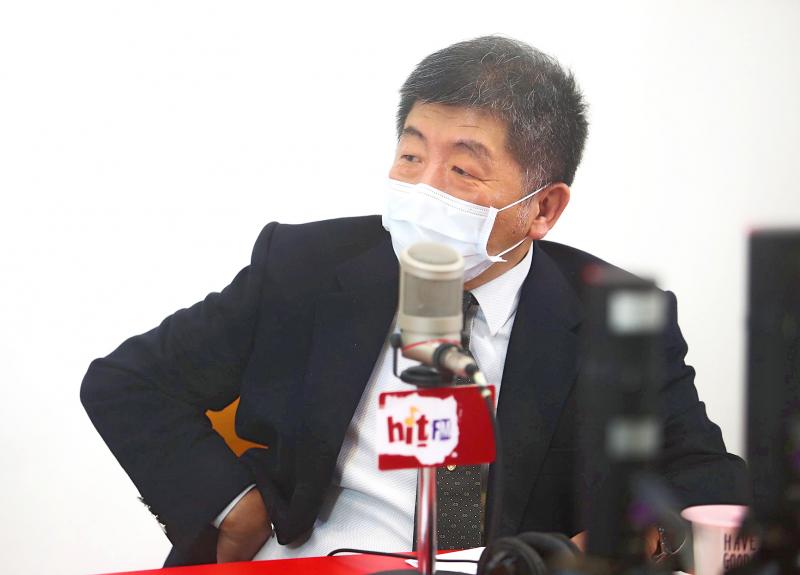Taiwan was close to signing a contract to secure 5 million doses of Pfizer-BioNTech’s BNT162b2 COVID-19 vaccine last year, Minister of Health and Welfare Chen Shih-chung (陳時中) said yesterday, but the deal was halted at the last minute, with some speculating that it was due to Chinese interference.
Chen, who also heads the Central Epidemic Command Center, in December last year announced that Taiwan had secured nearly 15 million COVID-19 vaccine doses — including about 10 million doses of the AstraZeneca vaccine and about 4.76 million doses from the global COVAX program — and that a contract to buy about 5 million doses from another company was about to be signed.
The center has not commented on rumors that a contract to purchase BNT162b2 vaccines was obstructed by Pfizer-BioNTech’s Chinese partner, Shanghai Fosun Pharmaceutical Group (上海復星醫藥集團), which had obtained the right to market and distribute the BNT162b2 vaccine in Taiwan and China, including Macau and Hong Kong.

Photo: CNA
In an interview with Hit FM radio host Clara Chou (周玉蔻), Chen yesterday for the first time confirmed that Taiwan was close to signing the contract with Pfizer-BioNTech, but the deal was halted at the last minute.
“We had been negotiating directly with BioNTech at the time ... and we had even prepared the news release” to announce the deal, he said.
“However, maybe someone does not want Taiwan to be too happy, so it [the contract signing] was halted,” he said.
He had to bite his tongue several times not to announce the deal at the center’s news conferences, because the deal had not yet been signed and he was afraid that an external force would intervene if he announced it too soon, Chen said.
Asked if Shanghai Fosun might have obstructed the deal, he said that many factors could have led to the result.
BioNTech said that there were “different internal opinions” and concerns over “global vaccine distribution,” he said, adding that the center would have to take even more care in such negotiations.
An analyst said that Beijing has previously used the pandemic to pressure Taiwan.
“China’s continued weaponization and politicization of people’s health — which should be apolitical — should not come as a surprise, especially given everything that has been going on with the WHO,” Jessica Drun, a Taiwan-China expert at the Project 2049 think tank, wrote on Twitter.
Chen said that he had been hesitant to answer questions about COVID-19 vaccine procurement in the past few months, because he had been worried that such a situation might arise, as the nation has faced many last-minute difficulties before attending World Health Assembly technical briefings or other international events.
He felt wronged when people criticized the center for not disclosing its progress in securing COVID-19 vaccines, but he was unable to reveal more details, Chen said, adding that he could only promise that it would release news as soon as a contract had been signed.

AGING: As of last month, people aged 65 or older accounted for 20.06 percent of the total population and the number of couples who got married fell by 18,685 from 2024 Taiwan has surpassed South Korea as the country least willing to have children, with an annual crude birthrate of 4.62 per 1,000 people, Ministry of the Interior data showed yesterday. The nation was previously ranked the second-lowest country in terms of total fertility rate, or the average number of children a woman has in her lifetime. However, South Korea’s fertility rate began to recover from 2023, with total fertility rate rising from 0.72 and estimated to reach 0.82 to 0.85 by last year, and the crude birthrate projected at 6.7 per 1,000 people. Japan’s crude birthrate was projected to fall below six,

US President Donald Trump in an interview with the New York Times published on Thursday said that “it’s up to” Chinese President Xi Jinping (習近平) what China does on Taiwan, but that he would be “very unhappy” with a change in the “status quo.” “He [Xi] considers it to be a part of China, and that’s up to him what he’s going to be doing, but I’ve expressed to him that I would be very unhappy if he did that, and I don’t think he’ll do that. I hope he doesn’t do that,” Trump said. Trump made the comments in the context

SELF-DEFENSE: Tokyo has accelerated its spending goal and its defense minister said the nation needs to discuss whether it should develop nuclear-powered submarines China is ramping up objections to what it sees as Japan’s desire to acquire nuclear weapons, despite Tokyo’s longstanding renunciation of such arms, deepening another fissure in the two neighbors’ increasingly tense ties. In what appears to be a concerted effort, China’s foreign and defense ministries issued statements on Thursday condemning alleged remilitarism efforts by Tokyo. The remarks came as two of the country’s top think tanks jointly issued a 29-page report framing actions by “right-wing forces” in Japan as posing a “serious threat” to world peace. While that report did not define “right-wing forces,” the Chinese Ministry of Foreign Affairs was

PREPAREDNESS: Given the difficulty of importing ammunition during wartime, the Ministry of National Defense said it would prioritize ‘coproduction’ partnerships A newly formed unit of the Marine Corps tasked with land-based security operations has recently replaced its aging, domestically produced rifles with more advanced, US-made M4A1 rifles, a source said yesterday. The unnamed source familiar with the matter said the First Security Battalion of the Marine Corps’ Air Defense and Base Guard Group has replaced its older T65K2 rifles, which have been in service since the late 1980s, with the newly received M4A1s. The source did not say exactly when the upgrade took place or how many M4A1s were issued to the battalion. The confirmation came after Chinese-language media reported